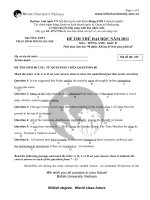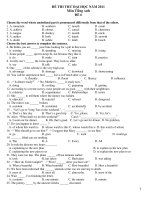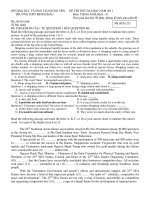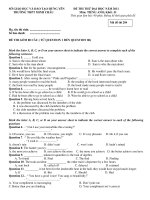ĐỀ THI THỬ ĐẠI HỌC NĂM 2011 MÔN: TIẾNG ANH pptx
Bạn đang xem bản rút gọn của tài liệu. Xem và tải ngay bản đầy đủ của tài liệu tại đây (121.83 KB, 5 trang )
TRƯỜNG THPT
NAM KHOÁI CHÂU – HUNG YEN
Họ tên thí sinh:
Số báo danh:
ĐỀ THI THỬ ĐẠI HỌC NĂM 2011
MÔN: TIẾNG ANH
Thời gian làm bài: 90’
I. Find the word with the stress pattern different from that of the other three words in each question.
1. A. considerate B. picturesque C. redundancy D. communicate
2. A. significant B. intelligent C. calculator D. American
3. A. delicious B. continuous C. conscientious D. malicious
4. A. control B. constant C. contour D. contrast
5. A. reindeer B. engineer C. pioneer D. referee
II. Choose the correct word or phrase to complete each sentence.
6………… had the van turned the corner than the wheel came off.
A. No sooner B. Scarcely C. Hardly D. No longer
7. …….his advice, I would never have got the job.
A. Except B. Apart from C. But for D. As for
8. A number of parents ………angry and worried about pornography falling into the hands of their children.
A. are B. is C. who is D. who are
9. He’ll always be the same – a leopard never changes its ……….
A. pattern B. spots C. coat D. stripes
10. This new law will take …… from the beginning of next month.
A. influence B. power C. effect D. force
11. It was a hot day and many people were ……… their way to the beach.
A. taking B. hitting C. making D. setting
12.The ……were told to fasten their seat belts as the plane began its descent.
A. customers B. riders C. flyers D. passengers
13. He said he would pay back the money ……the sake of peace in the town.
A. to B. for C. by D. in
14. After trial lasting three weeks, Jones was …… not guilty of murder.
A. stated B. found C. given D. decided
15. He kept his marriage a secret for years, but eventually the truth ………
A. came out B. came through C. went out D. turned out
16.
It
isn’t
quite…
that
he
will
turn
up
at
the
meeting.
A.
certain
B.
exact
C.
right
D.
sure
17.
Faraday’s
accomplishments
seem
more
wonderful
when
we
realize
that
he
had
very education.
A.
a
few
B.
few
C.
a
little
D.
little
18. My brother lives on the fifteenth floor of that …… of flats.
A. building B. block C. tower D. house
19. He’s a very difficult person to …….with.
A. deal B. do C. get D. treat
20. Most of the water in the world …….salt water. What percentage of the water in the world ………fresh water.
A. is – is B. is – are C. are – is D. are – are
21. Mr. Robbins, accompanied by his wife and children, …… tonight.
A. arrives B. arriving C. is arriving D. are arriving
22. The majority of the students …….him to be innocent.
A. believe B. believes C. is believing D. are believing
23. Mark seemed to be in good mood, ….he snapped at me angrily when I asked him to join us.
A. yet B. so C. for D. and
24. Timmy spent …… money buying movie tickets that he didn’t have enough left to buy a soft drink.
A. such B. such a lot C. too much D. so much
25. Sally hoped …… to join the private club. She could make important business contacts there.
A. inviting B. being invited C. to invite D. to be invited
26. We were shocked to hear the news of your …………
A. having fired B. having been fired C. to be fired D. to have been fired
27. Above the fireplace ………
A. was portrait of Lenin B. put a portrait of Lenin
C. hang a portrait of Lenin D. lay a portrait of Lenin
28. He became a millionaire by ……… of hard work and a considerable amount of luck.
A. process B. effect C. cause D. dint
29. If she hadn’t been sleepless last night, she …………better now.
A. could have felt B. would feel C. should have felt D. had felt
30. Athur assured me that he was going to come, but he hasn’t ……….yet.
A. turned in B. turned up C. turned on D. turned round
III. Read the text and decide which answer (A, B, C or D) best fits each space.
POLLUTION
There are various types of pollution in the world. The most (31) …… one is air pollution. It is caused mostly by
factories which exude smoke. This smoke pollutes the atmosphere (32) ……….dust and cinder which can cause
various types of diseases like lung cancer, heart failure and sinus infection (33) ……….inhaled. Carbon monoxide
from exhaust (34) ………of vehicles is also very dangerous and can cause instant death when inhaled in (35)
……….amount.
Water pollution is the pollution that occurs in the rivers, seas, oceans and other waterways. Water pollution is
normally caused by the (36) ………….of waste like garbage and faeces. The marine life in these waters will be
affected. Some sea creatures perish while others (37) …… the toxic extracts of the poisonous waste in their fat
glands.
When human beings eat these creatures, they will (38) …………fall in or die. In Japan alone, every year,
thousands of people suffer (39) ……….strange diseases due to mercury poisoning. Others either lose their mental (40)
…… or meet their deaths.
31. A. widespread B. extensive C. expanding D. intensive
32. A. through B. in C. by D. with
33. A. after B. when C. once D. upon
34. A. tubes B. tracts C. pipes D. sprayer
35. A. tremendous B. unlimited C. exceeding D. excessive
36. A. throwing B. pouring C. dumping D. discarding
37. A. stock B. store C. hold D. contain
38. A. either B. both C. equally D. constantly
39. A. by B. from C. through D. with
40. A. aptitude B. competence C. ability D. capacity
III. From the underlined parts (A), (B), (C), or (D), identify the one that is not correct.
41. The basic law of addition, subtraction, multiplication and division are taught to all elementary
A B C
school students.
D
42. A large percent of Canadian export business is with the United States.
A B C D
43. The Dodge brothers began doing their own automobiles in 1914, and produced one of the first
A B
American automobiles with an all-steel body.
C D
44. Psychologists use standardized tests to help measure abilities, aptitudes, interesting, and
A B C
personality traits.
D
45. Unlike many writings of her time, she was not preoccupied with morality.
A B C D
IV. Read the text and decide which answer (A, B, C or D) best fits each space.
You've
(46)
heard
someone
say
that
the
reason
you
caught
a
cold
was
that
you
were
'run down'.
People
generally
accept
that
if
you
are
(47)
pressure
or
run
down
you
are
more
likely
to get
ill.
But
is
this
really
true
(48)
is
it
just
an
old
wives'
tale?
The
problem
with
old
sayings
like this
is
that
it's
often
difficult
to
(49)
whether
they
are
true
or
not.
For
example,
if
you
ask
people with
colds
whether
they
are
feeling
run
down,
they
are
(50)
certain
to
say
yes.
People
without colds
are
more
likely
to
say
no.
So,
how
do
you
(51)
if
it's
the
cold
that
is
making
them
(52)
run
down
or
the
fact
that
they
are
run
down
that
is
making
them
more
likely
to
catch
a
cold?
Now
it seems
there
is
a
scientific
answer
to
this
question.
And
answer
is
yes
-
if
you
are
run
down
or
under stress,
you
are
more
likely
to
catch
a
cold.
Scientists
at
the
Common
Cold
Research
Centre
ran
a
series of
tests.
They
got
volunteers
without
colds
to
attend
the
centre,
where
they
were
first
given
a questionnaire
to
complete.
The
questions
measured
the
(53)
of
stress
each
volunteer
was
under. The
volunteers
were
then
deliberately
infected
with
a
cold
virus
and
left
to
see
whether
they
developed
a
cold.
After
many
people
had
been
tested,
the
researchers
looked
for
a
(54)
between
the
measured stress
level
and
the
chances
of
catching
a
cold.
They
found
that
the
higher
the
stress,
the
more
likely the
person
was
to
catch
a
cold.
At
the
moment
it
is
not
known
why
stress
makes
someone
more
likely to
become
ill,
but
now
(55)
the
link
has
been
found,
researchers
might
be
able
to
investigate further.
They
may
even
find
different
ways
of
combating
disease.
46.
A
.
p
e
r
h
a
ps
B.
m
a
y
be
C.
pos
s
ibly
D
.
p
r
ob
a
bly
47.
A.
under
B.
behind
C.
at
D.
above
48.
A.
and
B.
or
C.
but
D.
so
49.
A.
show
B.
express
C.
state
D.
prove
50.
A.
nearly
B.
mostly
C.
almost
D.
surely
51.
A.
tell
B.
speak
C.
say
D.
suggest
52.
A.
be
B.
feel
C.
become
D.
get
53.
A.
amount
B.
number
C.
mass
D.
heap
54.
A.
combination
B.
joint
C.
link
D.
relation
55.
A.
that
B.
when
C.
because
D.
as
V. Choose the best answer A, B, C, or D to complete each sentence.
56. Children usually avoid swearing in front of adults, …………
A. so in order not to annoy or shock them. B. so not to annoy or shock them.
C. so as not to annoy or shock them. D. so not annoying or shocking them.
57. Having been selected to represent the class at the school meeting, …………
A. the members applauded him. B. a speech had to be given by him.
C. he gave a short acceptance speech. D. the members congratulated him.
58. The doctor insisted that his patient …………
A. did not work too hard for three months B. to take some vacation for three months
C. take it easy inside of three months D. take it easy for three months
59. Everyone at some time has difficulty in sleeping but if you miss a couple of hours of sleep, …….
A. no harm is done by you B. you do no harm
C. no harm is done D. you’ll do no harm.
60. …….was lowered to the seabed in a glass container to make observations is debated.
A. Alexander the Great who B. Alexander the Great
C. Whether Alexander the Great D. What Alexander the Great
VI. Read the text and choose the best answer.
Line
5
10
15
20
In seventeenth-century colonial North America, all day-to-day cooking was done in the fireplace.
Generally large, fireplaces were planned for cooking as well as for warmth. Those in the Northeast
were usually four or five feet high, and in the South, they were often high enough for a person to walk
into. A heavy timber called the mantel tree was used as a lintel to support the stonework above the
fireplace opening. This timber might be scorched occasionally, but it was far enough in front of the
rising column of heat to be safe from catching fire.
Two ledges were built across from each other on the inside of the chimney. On these rested the
ends of a "lug pole" from which pots were suspended when cooking. Wood from a freshly cut tree
was used for the lug pole, so it would resist heat, but it had to be replaced frequently because it dried
out and charred, and was thus weakened. Sometimes the pole broke and the dinner fell into the fire.
When iron became easier to obtain, it was used instead of wood for lug poles, and later fireplaces had
pivoting metal rods to hang pots from.
Beside the fireplace and built as part of it was the oven. It was made like a small, secondary
fireplace with a flue leading into the main chimney to draw out smoke. Sometimes the door of the
oven faced the room, but most ovens were built with the opening facing into the fireplace. On baking
days (usually once or twice a week) a roaring fire of "oven wood," consisting of brown maple sticks,
was maintained in the oven until its walls were extremely hot. The embers were later removed, bread
dough was put into the oven, and the oven was sealed shut until the bread was fully baked.
Not all baking was done in a big oven, however. Also used was an iron "bake kettle," which
looked like a stewpot on legs and which had an iron lid. This is said to have worked well when it was
placed in the fireplace, surrounded by glowing wood embers, with more embers piled on its lid.
61. Which of the following aspects of domestic life
in colonial North America does the passage
mainly discuss?
(A) Methods of baking bread
(B) Fireplace cooking
(C) The use of iron kettles in a typical
kitchen
(D) The types of wood used in preparing
meals
62. The author mentions the fireplaces built
in the South to illustrate
(A) how the materials used were similar
to the materials used in northeastern
fireplaces
(B) that they served diverse functions
(C) that they were usually larger than
northeastern fireplaces
(D) how they were safer than
northeastern fireplaces
63. The word "scorched" in line 5 is closest
in meaning to
(A) burned
(B) cut
(C) enlarged
(D)bent
64. The word "it" in
line 6 refers to
(A) the stonework
(B) the fireplace opening
(C) the mantel tree
(D) the rising column of heat
65. According to the passage, how was food
66. The word "obtain" in line 12 is closest in
meaning to
(A) maintain
(B) reinforce
(C) manufacture
(D) acquire
67. Which of the following is mentioned in paragraph 2 as
a disadvantage of using a wooden lug pole?
(A) It was made of wood not readily
available.
(B) It was difficult to move or rotate.
(C) It occasionally broke.
(D) It became too hot to touch.
68. It can be inferred from paragraph 3 that, compared to
other firewood, "oven wood" produced
(A) less smoke
(B) more heat
(C) fewer embers
(D) lower flames
69. According to paragraph 3, all of the following were
true of a colonial oven EXCEPT:
(A) It was used to heat the kitchen every
day.
(B) It was built as part of the main
fireplace.
(C) The smoke it generated went out
through the main chimney.
(D) It was heated with maple sticks.
usually cooked in a pot in the seventeenth century?
(A) By placing the pot directly into the
fire
(B) By putting the pot in the oven
(C) By filling the pot with hot water
(D) By hanging the pot on a pole over
the fire
70. According to the passage, which of the following
was an advantage of a "bake kettle"?
(A) It did not take up a lot of space in the fireplace.
(B) It did not need to be tightly closed.
(C) It could be used in addition to or
instead of the oven.
(D) It could be used to cook several
foods at one time.
VII. Choose the sentence (A, B, C, or D) which is closest in meaning to the one in bold
71. In all probability, he is coming
A. Undoubtedly, he will come. B. He is bound not to come
C. He is very likely to come. D. He is coming very soon.
72. No matter how hard Fred tried to start the car, he didn’t succeed.
A. Fried tried very hard to start the car, and succeeded.
B. Fried tried hard to start the car, and with success.
C. It’s hard for Fried to start the car because he never succeeded.
D. However hard he tried, Fried couldn’t start the car.
73. She strikes me as a very effective teacher.
A. I make an effective impression on the teacher. B. As a teacher, she always strikes me.
C. She is such an effective teacher that she always strikes her students.
D. My impression of her is that she is a very effective teacher.
74. I couldn’t help laughing when he told me that story.
A. I couldn’t resist laughing when he told me that story. B. I couldn’t help him tell that story.
C. I did not laugh when hearing that story D. The story he told me did not help at all.
75. It is open to question as to whether Jane will get the job.
A. The question is that whether Jane will get the job or not. B. It is not certain that Jane will get the job.
C. Jane is being interviewed for the job. D. If Jane could answer the question, she would get the job.
76. Mrs. Jones told me that her neighbors were moving to Florida.
A. Mrs. Jones is planning to move to Florida with her neighbors.
B. Mrs. Jones and her neighbors live in Florida.
C. I knew that Mrs. Jones had moved to Florida because her neighbors told me.
D. “My neighbors are moving to Florida,” said Mrs. Jones.
77. He was driving so fast that he could have had an accident.
A. If he had been driving very fast, he would have had an accident.
B. An accident happened, and it was caused by his very fast driving.
C. He didn’t have an accident although he was driving very fast.
D. He wasn’t driving fast enough to avoid an accident.
78. There is not too much to choose between the two essays.
A. Both essays are great B. One essay is just as bad as the other.
C. One of the essays is optional D. Either essay can be chosen.
79. It is no use reading that book.
A. You should read that book B. That book has not been used
C. That book is not worth reading. D. I have used the book for a long time.
80. She told us to help ourselves to the apples in the baskets.
A. She offered us some apples in return for our help.
B. She wanted our help to pick the apples and put them in a basket.
C. She let us have as many apples as we wanted.
D. She wanted us to do all the work ourselves.









